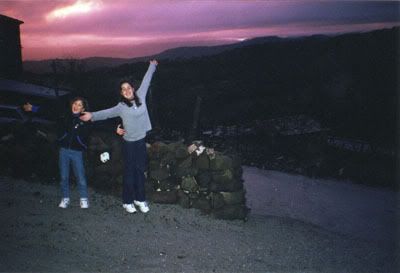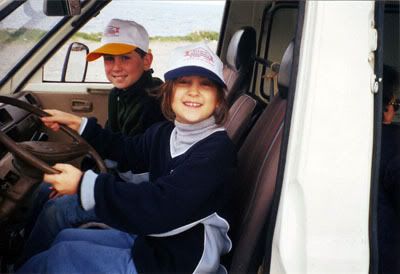Family history and my identity
Before I even start writing up what I want to say, I need to make something very clear: 'Lesbian' is not just a word used to refer to homosexual women. Thousands of years prior to the (female) homosexual movement adopting this word to summarise their identity, people were living on the Greek island of Lesbos. For many many thousands of years, this people group have been identifying themselves as 'Lesbians'. Which makes sense. That is a good word to use to refer to people from Lesbos.
My Yiayia is from Lesbos (see here and here for previous references). She is a Lesbian - ethnically. And so I also get to call myself a Lesbian - ethnically. Sometimes I wish I could just say "Lesbian" without everyone assuming that I am referring to a homosexual woman. But I guess that's the way language works. I am about to write an entry about my Lesbian heritage. To make the language work for you, I will use the term "Lesvian" instead, because the "b" sound and the "v" sound are the same in Greek.
----------------------------------
Last night Matt and I went to a book launch. Vasilis Vasilas, a younger Lesvian migrant, has been archiving the photographs and stories of the older pre-war and post-war Lesvian migrants online and has finally published them into a book. My Aunty Fay invited us to come along with her and my (second) cousin Parry (a fairly recent migrant himself). Yiayia and Papou didn't come. Yiayia knew she would get very emotional and she wasn't really prepared for that. Also she doesn't leave the house very often.
The launch was very interesting, even though it was mostly in Greek. My favourite professor, Vras, was the big speaker, and he was excellent. There was great food and it was nice to hang out with Aunty Fay and Parry. It was also nice to get such a great insight into the experiences of the migrants themselves.
However the experience of sitting in a room packed to the brim, bustling with people speaking Greek, dressing Greek, gesticulating Greek, breathing Greek - it was kind of alienating. I really want to grab hold of this community's story and say:
"Yes! If there were no Lesvian migrants to Australia, if no Lesvian community existed here, then I would not exist! I belong to this community!"
But I can't say that. I can't even speak the same language as this community. It's a very awful feeling, this kind of half-belonging. I know that I am a Lesvian. I will carry Yiayia's story with me as long as I am alive, and I will pass it on to any of my children and let them know about what she went through to live here. But I am not actually a Lesvian. I am Australian. I am a rag-tag mish-mash product of the "Populate or Perish" agenda and the multicultural policy. My family history spans the globe, but I don't actually belong to any of the places it came from.
I guess that's OK and I just have to learn to be content with it. But still there is a small part of me that yearns to be able to understand Greek and to go to and understand the topos my ancestors came from.

Georgia and I celebrating the sunset in Napi, Yiayia's village

Philip and Georgia pretending to drive Theo Yani's truck, somewhere on Lesbos
My Yiayia is from Lesbos (see here and here for previous references). She is a Lesbian - ethnically. And so I also get to call myself a Lesbian - ethnically. Sometimes I wish I could just say "Lesbian" without everyone assuming that I am referring to a homosexual woman. But I guess that's the way language works. I am about to write an entry about my Lesbian heritage. To make the language work for you, I will use the term "Lesvian" instead, because the "b" sound and the "v" sound are the same in Greek.
----------------------------------
Last night Matt and I went to a book launch. Vasilis Vasilas, a younger Lesvian migrant, has been archiving the photographs and stories of the older pre-war and post-war Lesvian migrants online and has finally published them into a book. My Aunty Fay invited us to come along with her and my (second) cousin Parry (a fairly recent migrant himself). Yiayia and Papou didn't come. Yiayia knew she would get very emotional and she wasn't really prepared for that. Also she doesn't leave the house very often.
The launch was very interesting, even though it was mostly in Greek. My favourite professor, Vras, was the big speaker, and he was excellent. There was great food and it was nice to hang out with Aunty Fay and Parry. It was also nice to get such a great insight into the experiences of the migrants themselves.
However the experience of sitting in a room packed to the brim, bustling with people speaking Greek, dressing Greek, gesticulating Greek, breathing Greek - it was kind of alienating. I really want to grab hold of this community's story and say:
"Yes! If there were no Lesvian migrants to Australia, if no Lesvian community existed here, then I would not exist! I belong to this community!"
But I can't say that. I can't even speak the same language as this community. It's a very awful feeling, this kind of half-belonging. I know that I am a Lesvian. I will carry Yiayia's story with me as long as I am alive, and I will pass it on to any of my children and let them know about what she went through to live here. But I am not actually a Lesvian. I am Australian. I am a rag-tag mish-mash product of the "Populate or Perish" agenda and the multicultural policy. My family history spans the globe, but I don't actually belong to any of the places it came from.
I guess that's OK and I just have to learn to be content with it. But still there is a small part of me that yearns to be able to understand Greek and to go to and understand the topos my ancestors came from.

Georgia and I celebrating the sunset in Napi, Yiayia's village

Philip and Georgia pretending to drive Theo Yani's truck, somewhere on Lesbos